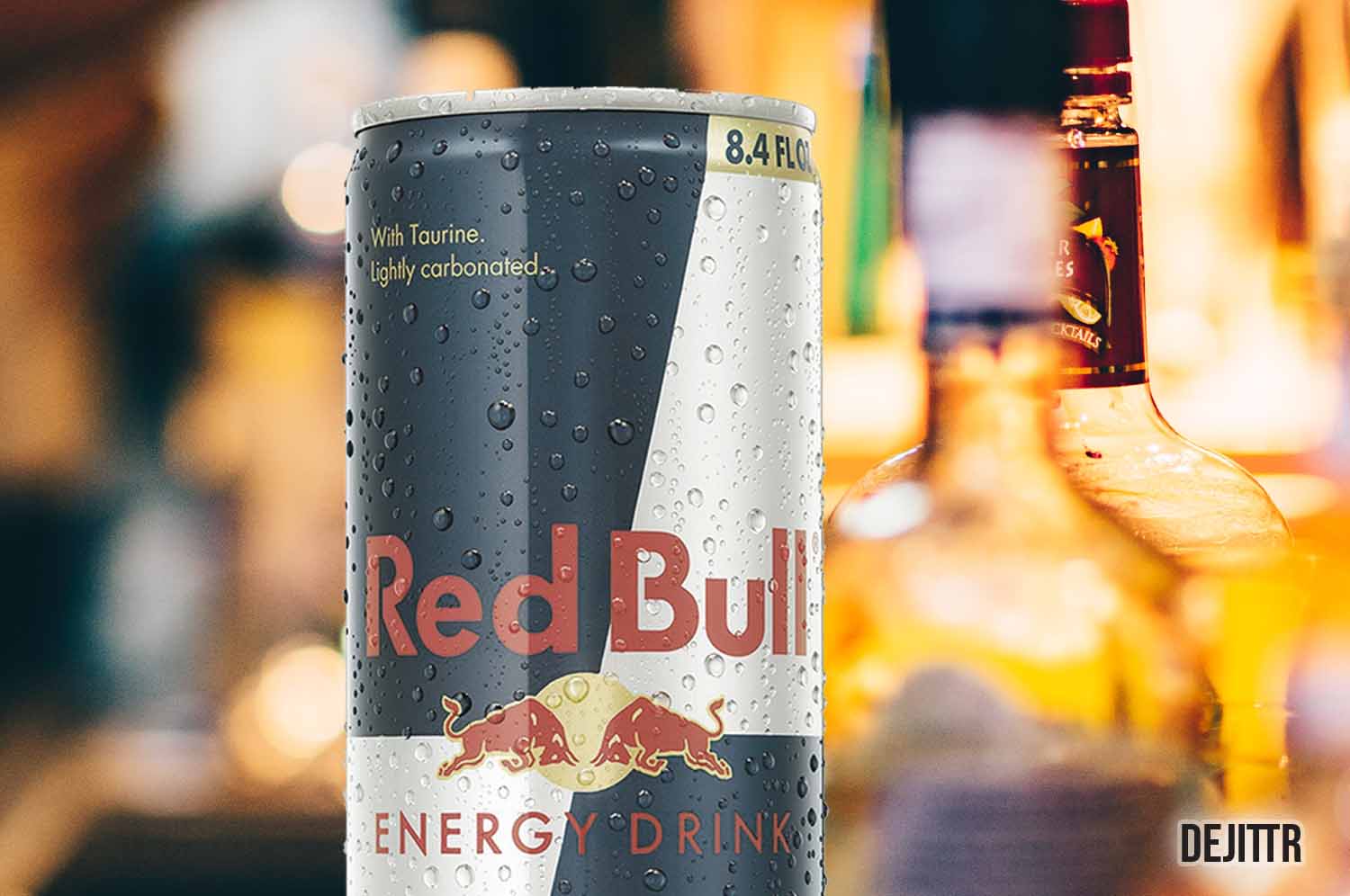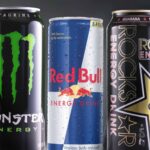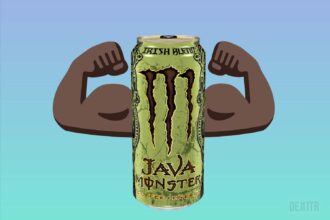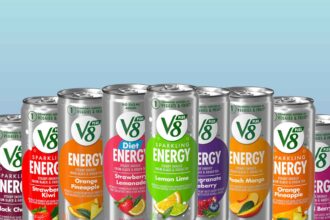Red Bull was one of the first energy drinks introduced to the North American mass market and became a leader in its category. With novelty and exposure come rumors, and Red Bull is no exception.
From accusations of alcohol content and bull semen to exaggeration of potential side effects and, there is plenty that muddies the truth about Red Bull. But we’re here to bust the myths!
Key Takeaways:
Red Bull is alcohol and animal free. Mixing it with alcohol is not recommended. While the energy drink doesn’t contain alcohol, it is still not free from side effects like dehydration, cramps, and vision impairment.
In this article, we will look at the truth about Red Bull, including what’s in the drink, how much of it you can safely consume and whether it is intoxicating. By the end, you’ll clearly understand who the beverage is for, its side effects and whether it aligns with your religious and personal health choices. Let’s get started by tackling the intoxication myth.
Does Red Bull Contain Alcohol (or Anything Else to Intoxicate You)?
Red Bull does not contain alcohol. While some contents in Red Bull are addictive, none are intoxicating, meaning Red Bull is 100% safe to drink for sober people or practice Islam (which prohibits alcohol intake).
Addictiveness and intoxication are often confused because the most famous intoxicating substance, alcohol, is also one of the most addictive. However, everything from sugar and salt to caffeine and scents can be addictive (obviously to different degrees).
Not everything that can be addictive is intoxicating.
Drinks that impair judgment can be intoxicating. Consuming a deadly dose of Red Bull can result in blurred vision, which would be an intoxicating state. But this effect is not because of alcohol.
Why do People Think Red Bull Contains Alcohol?
Ever heard of a “Vodka Red Bull”?
What about a “Jäger Bomb”?
If not, both are insanely popular drinks among the “I want to get drunk, but party all night” crowd. The recipe is simple: combine Red Bull (an upper) and alcohol (a downer).
Some people think Red Bull contains alcohol thanks to the popularity of those two alcoholic beverages. It’s logical to think that Red Bull has created a new, alcoholic line (like Chelada, which is Bud Light’s version of a “red beer”).
Another myth started in Mexico when a young driver got into a car crash after consuming over three cans of Red Bull.
Because the person making the assertion didn’t drink alcohol, he couldn’t tell that his vision blurring (an effect of caffeine overdose) wasn’t an effect of alcohol.
Because alcohol is Haram (prohibited) in Islam, Muslims who learned of this dutifully started warning other Muslims.
Red Bull had to come out with a clarification, yet the rumor continues to thrive to this day.
One of the reasons is that sensationalist user-generated media like Tweets and YouTube videos keep getting ranked instead of pages citing Red Bull’s assertion.
Why Mixing Red Bull and Alcohol is a Growing Concern?
Simply put: mixing Red Bull with alcohol can result in alcohol overdose.
Most functional alcohol consumers have an idea of their consumption limit, and they gauge this limit by the number of glasses and types of beverages.
But an ever more prominent part of the decision to stop drinking alcohol is a sense of reaching one’s limit. This decision is qualitative and entails feeling sad/low.
The depressive effect of alcohol is what signals functional alcohol consumers to stop drinking. Since Red Bull contains caffeine and other stimulants that can boost alertness and focus, it can suppress the depressive effects of alcohol. That’s why it is rare to see someone get ‘sad drunk’ on a Vodka Red Bull.
Most health experts who warn against Red Bull and alcohol mixing are concerned about the potential alcohol overdose that can occur when a person cannot regulate one’s intake.
If you count your alcohol intake by volume and stop when you’ve had enough, Red Bull’s presence in the beverage doesn’t harm your health.
But if you go by vague indicators like your mood or nausea, then Red Bull might prevent you from finding your limit when drinking alcohol.
What’s in Red Bull?: List of Ingredients (With Their Core Function)
Red Bull is an energy drink that is one part cocktail of stimulants and one-part flavoring agents and preservatives. All of Red Bull’s ingredients are listed on the package, and the brand doesn’t hide its contents.
The following table shows the core function of every ingredient in Red Bull:
| Red Bull Ingredient | Its Function |
| Glucose | Sweetens the beverage and is a source of energy |
| Sucrose | Neutralizes some of the beverage’s bitterness |
| Carbonated Water | Acts as a medium to combine the ingredients |
| Taurine (0.4%) | Stimulates the brain and has an antioxidant effect |
| Flavors | Help improve the beverage’s taste |
| Caramel I | Colorant |
| Riboflavin | Colorant |
| Caffeine (0.03%) | A stimulant that is responsible for a bulk of the energy drink’s buzz. |
| Citric Acid | Contributes to Red Bull’s taste profile and regulates the drink’s acidity |
| Sodium Bicarbonate | Is an acidity regulator for the most part |
| Magnesium Carbonate | Is an acidity regulator for the most part |
| Niacinamide (Vitamin B3) | Promotes skin health and keratin growth |
| Pantothenic Acid (Vitamin B5) | Helps break down food into energy. It is responsible in part for the energy peak one feels after drinking Red Bull. |
| Vitamin B6 | Helps improve amino acids in the bloodstream |
| Vitamin B12 | It promotes Red Blood Cell formation and can prevent anemia |
The table above shows that most Red Bull ingredients are generally healthy. However, none of them are safe to overconsume, and the most chemically neutral content in Red Bull is the carbonated water used to mix the ingredients.
Even that can harm your tooth enamel and stomach lining. That is why it is crucial to drink Red Bull with caution.
The vitamin content in Red Bull isn’t significant enough to overdose on. The same applies to colorants.
You’ll overdose on caffeine well before you overdose on Vitamin B12 in Red Bull. The general rule of thumb is to take the most potent ingredient in a beverage and use its maximum allowed use as the limit-setter.
Red Bull’s caffeine content is high enough to reach just below the maximum permitted caffeine intake for adults within two cans. Consequently, most athletes avoid drinking more than two servings of Red Bull.
The energy drink cans in some countries also feature instructions not to drive when one has had over two consecutive servings.
Risk of Overconsumption of Red Bull
Overconsuming Red Bull happens on a spectrum, and each degree of overconsumption has slightly more severe consequences. Let’s look at the risk of overconsumption of Red Bull and its consequences.
You can overdose on Red Bull by finishing more than two energy drink cans in one day. Side effects can start becoming apparent from the second can.
How much Red Bull affects you depends on your caffeine tolerance, how hydrated you are, and whether you consume the beverage on an empty stomach.
Dehydration
Mild dehydration can start from the first can of Red Bull. Your water consumption habits dictate how much this affects you.
To avoid dehydration, you should begin sipping (not chugging) water soon after having Red Bull.
Stomach Cramps
Red Bull’s ingredients, including vitamins and acidity regulators, can cause an upset stomach. This makes stomach cramps one of the net side-effects of having too much Red Bull.
Don’t drink Red Bull on an empty stomach to avoid stomach cramps.
Muscle Cramps
Muscle cramps happen because of dehydration and poor recovery.
People who use Red Bull as a pre-workout beverage can go overboard when working out. When it is time to recover from the workout, they need more Branched Chain Amino Acids (BCAAs), which the beverage doesn’t have (this can result in muscle cramps).
Highly Recommended Read:
Lately, BCAAs seem to be on every label as a selling point, but are they essential for the body? You’re in luck because we wrote an excellent resource demystifying BCAAs. When you’re done reading this article, check out our article on What Are BCAAs, & Are They Worth the Hype? (8-minute read).
Electrolyte beverages post-Red Bull and a creatine serving once a day can offset muscle cramps.
Acidic Reflux
While Red Bull contains acidity regulators, it is far from being pH-neutral. Red Bull’s overall acidic nature can make a consumer’s stomach environment more acidic. Acidity can result in heartburn, nausea, and vomiting.
One way to avoid acid reflux is to have alkalizing foods like bananas or coconut water in your diet if you consume Red Bull regularly.
Mood Alteration
Mood swings are a rare result of Red Bull overconsumption because they are contingent on pre-existing conditions of the consumer.
People with IBS, bipolar tendencies, and ADHD can experience an instant difference in mood because of Red Bull. But the subsequent crash can result in irritability, anger, and sadness.
People with mood disorders should avoid Red Bull or take half the servings permitted for adults.
Blurred Vision
Blurred vision is one of the extreme side effects of having:
- More than two cans of Red Bull as an adult
- More than one can of Red Bull as a teenager
It usually happens if the servings are taken one after the other with little water. Impaired vision can be accompanied by drowsiness and heart palpitations.
Avoid blurred vision by drinking as much Red Bull as is allowed for your age group.
Increased Blood Pressure
Increased blood pressure is a mild side effect of Red Bull that starts with one sip and continues to rise exponentially.
Generally, a single can of Red Bull doesn’t increase blood circulation rate to an alarming extent. It just speeds up the metabolism temporarily and helps one have more energy in the short term.
Add vegetables and healthy drinks to your diet to avoid high blood pressure from regular Red Bull use.
Is There Any Animal or Animal By-products in Red Bull?
Red Bull is vegan and does not contain any animal derivative, meat, blood, or animal byproducts.
This energy drink contains lab-generated Taurine, which is otherwise an animal byproduct. This can result in rumors regarding Red Bull having animal contents.
Taurine, Red Bull, and Bull Semen: The Truth
Taurine is a stimulant that helps the body and mind feel energized. At least, that is the claim of energy drink manufacturers who cite a few studies that lean in their favor. The substance was initially isolated from Ox Bile in the 1800s and Bull Semen in the early 90s.
Nowadays, it is generated in factory-scale labs. But the name Red’ Bull’ and the Bull Semen origins of Taurine have fuelled the rumor that the beverage maker adds Bull Sperm to its energy drink. This is self-evidently absurd because Red Bull sells around 7.5 billion cans a year.
There are around 1 billion bulls in the world. The beverage manufacturer would need to monopolize the global Bull population from India to Africa to fulfill its Taurine requirements.
In other words, even if you can’t trust Red Bull, you can trust capitalism. And using lab-generated Taurine help, all the big brands save money and manufacture more units.
Aside from the Taurine in Red Bull, nothing else in the beverage is rumored to be an animal product.
Frequently Asked Questions
Is Red Bull Halal or Haram?
Red Bull is Halal as none of the individual ingredients listed on the can are prohibited in the Quran. It also doesn’t intoxicate, has zero alcohol, and is vegan, which aligns it with the proper diet in Sharia Law.
Does Red Bull Contain Pork Ingredients?
While Red Bull was a subject of a malicious rumor campaign aimed at alienating the beverage’s Muslim consumers, it has been proven to contain zero pork ingredients.
Red Bull in the US is the same as Red Bull in Saudi, even though the latter goes under a Halal certification process.
The energy drink manufacturer saves money by not getting its western product Halal certified. But since its formula is uniform, one can assume that the halal certification of Red Bull in the Middle East reflects its halal status in the US.
Still, if a consumer is skeptical, he can buy Red Bull imported from Dubai. Each can of Red Bull distributed in Arab countries features a Halal stamp to ease sharia-conscious consumers.
Should I Drink Red Bull Every Day?
Even though most reasons for avoiding Red Bull are far from valid and grounded in rumors, it is still best to avoid Red Bull dependency.
One of the reasons for this is the beverage’s price (see cheaper Red Bull alternatives).
Another reason is the sugar content of the drink.
But if you understand your diet and can adjust it to make room for Red Bull, you can drink it daily.
Recap: Red Bull and Alcohol
Red Bull is alcohol-free and animal-free. But because it is the market leader in energy drinks and has an enviably inflated revenue, it is targeted by rumor campaigns and some valid criticism.
Ultimately, drinking Red Bull is like drinking a sugary espresso followed by a coke. In fact, the latter is worse for your body than Red Bull, which contains vitamins and brain-health stimulants.
Photo altered by dejittr.com | Photo attribution: Sandra Seitamaa













